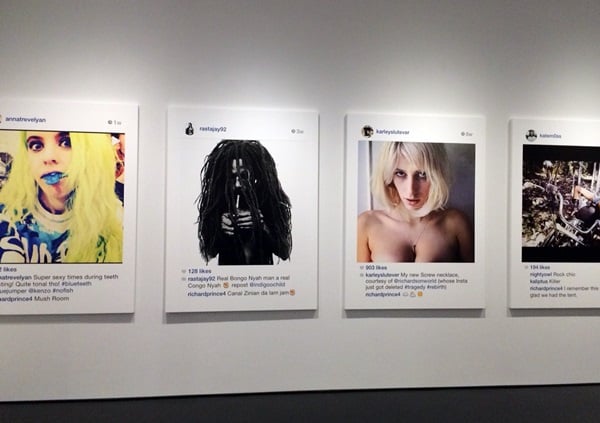
Renowned photographer Donald Graham brought a federal complaint against Gagosian Gallery, Larry Gagosian, and artist Richard Prince on December 30 for unauthorized use of one of his famous images, Rastafarian Smoking a Joint, in the 2014 show “New Portraits.” Along with the black-and-white image of a Rastafarian man lighting a marijuana cigarette, which is the subject of the suit, the show featured images that had been taken from Instagram posts, blown up and modified with some commentary added by Prince.
According to the complaint, a copy of which was obtained by artnet News, the infringing work included a reproduction of the copyrighted photograph, with the only modifications being “minor cropping of the bottom and top portions” of the image leaving most of the image “fully in tact,” and “framing the Copyrighted Photograph with elements of the Instagram graphic user interface” including a line of text above the photograph with a “thumbnail” image and username of the Instagram account holder responsible for posting the image to Instagram and lines of text below the image including “richardprince4 Canal Zinian da lam jam” with a pictogram of a fist. The complaint also lists the resizing of the photograph to 4 ft. ¾ inches by 5 ft. 5 ¾ inches as a modification.
UPDATE: Experts weigh in on the significance of the new case.
The move follows reports in early 2015 that Graham’s attorney at the time, Sergio Munoz Sarmiento (his attorneys in this suit are Christopher Davis and David Marriott of Cravath, Swaine & Moore), had sent cease and desist letters to both Gagosian and Prince following the show. Neither Graham nor Gagosian has responded to our request for comment. Christopher Davis declined to comment at this time.
“Exhibit A” in the complaint is the photograph by Donald Graham, the “Copyrighted Photograph.”
According to last year’s report on Hyperallergic, the letters “reputedly [asked] Gagosian and Prince to stop exhibiting and/or distributing the Prince work and any other materials containing unauthorized reproductions of Graham’s work.”
Prince took Graham’s Rastafarian image as it appeared from a third person who posted it on Instagram, under the account of @rastajay92. Prince added the comment: “Canal Zinian da lam jam.”
While the show was up, Graham himself took to Instagram to address the use of the photo, commenting: “Appropriated Exhibit. The only way you’d know my work was a part of this display is…well, that’s just it, you wouldn’t know. #PrinceofAppropriation.” In a separate post, Graham uploaded his Rastafarian image with the comment: “How to credit a work: ‘Rastafarian Smoking a Joint’ ©1997 Donald Graham. #PrinceofAppropriation.”
artnet News contributor Paddy Johnson weighed in on the show in a column aptly titled “Richard Prince Sucks” which you can read here and explored some of the newer developments that arose involving the works in that show in a follow-up interview.
According to the suit, Graham spent two weeks trekking the mountains of Jamaica in May of 1996, with his photo equipment and mobile studio “in order to capture photographs of the Rastafarian people in their surrounding environment.” He later copyrighted the series, including the work in question, which he sells in editions, through his Paris dealer A. Galerie as well as his studio.
“Exhibit B” in the complaint is the allegedly infringing work by Richard Prince.
“Graham has never licensed the Copyrighted Photograph or made it available for any commercial purpose,” other than the above-mentioned sales. The complaint alleges that the work was a “seminal work” in Graham’s career and that the photographer displayed a 4 ft. by 5 ft. fine art print of the image as “one of only two of his fine artworks (the Copyrighted Photograph being the more prominently featured of the two) at the New York apartment and studio he maintained from 1997 until 2011.”
The complaint notes that Prince has “achieved notoriety in the ‘appropriation art’ industry for his blatant disregard of copyright law. Mr. Prince consistently and repeatedly has incorporated others’ works into works for which he claims sole authorship with obtaining permission from, or providing compensation, recognition or attribution to, the original work’s author.”
To bolster its argument, the attorneys include a 2011 comment from Prince about the way his career success comes into play here. Prince is quoted: “Copyright has never interested me. For most of my life I owned half a stero so there was no point in suing me, but that’s changed now and it’s interesting…So sometimes it’s better not to be successful and well known and you can get away with much more. I knew what I was stealing 30 years ago but it didn’t matter because no one cared.”
The suit notes that on October 25, 2014, Prince responded to a Twitter post made by Graham’s wife about the appropriation saying “You can have your photo back. I don’t want it. You can have all the credit in the world.”
The allegations Graham has made against Gagosian and Prince echo copyright charges brought by photographer Patrick Cariou in 2009, when Prince used images from his “Yes Rasta” series in paintings for his 2008 “Canal Zone” show at Gagosian Gallery. The court ultimately held that most of Prince’s works, but not all of them, were protected under the fair use clause and in March 2014, Prince settled with Cariou.
[h/t Courthouse News]